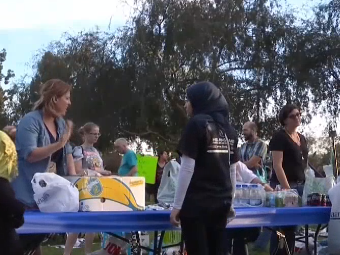Twelve people face court for feeding homeless in California
'The legislation often comes rather from a desire not to see homeless people in public places'

Your support helps us to tell the story
From reproductive rights to climate change to Big Tech, The Independent is on the ground when the story is developing. Whether it's investigating the financials of Elon Musk's pro-Trump PAC or producing our latest documentary, 'The A Word', which shines a light on the American women fighting for reproductive rights, we know how important it is to parse out the facts from the messaging.
At such a critical moment in US history, we need reporters on the ground. Your donation allows us to keep sending journalists to speak to both sides of the story.
The Independent is trusted by Americans across the entire political spectrum. And unlike many other quality news outlets, we choose not to lock Americans out of our reporting and analysis with paywalls. We believe quality journalism should be available to everyone, paid for by those who can afford it.
Your support makes all the difference.Feeding homeless people in a public park has led to 12 people being called to court to face charges in the Californian city of San Diego.
Police officers who handed out the citations claimed the recipients were breaking a rule which banned sharing food in public places.
The law was introduced by the City Council in October to help curb the spread of hepatitis A, following a huge outbreak of the disease in the city and the region surrounding it.
But critics have suggested the real motive behind the ban was to disperse homeless people from the area.
Megan Hustings from The National Coalition for the Homeless told The Independent that the charity has “long believed these type of laws that prevent a simple act of charity to be deeply disturbing”.
She said: “Many communities will cite a desire to ensure that food that is shared is prepared according to certain food preparation standards, but there is no documented cases of food poisoning coming from food that is shared with hungry people in public places. What we know from our homeless folks in communities that pass these types of food sharing bans is that the legislation often comes rather from a desire not to see homeless people in public places.”
She added: “There is generally a failing of communities to realise basic human needs, and how our social service systems are failing our citizens in providing these basic needs. Sharing food with people where they are outdoors can be critical to ensuring that they receive the nourishment they need.”
While cases of people with hepatitis A have decreased the city ordinance remains in place in Las Vegas.
So when volunteers began handing out supplies including food, water and toiletries to homeless people in the city's Wells Park, police swooped in to hand out citations to a dozen individuals.
A 14-year-old was among them.
“If I am going to be arrested for something let it be for feeding the homeless because I am just not going to apologise for doing the right thing,” Matthew Schneck, told NBC 7, after receiving a citation.
All were charged with breaking an urgency ordinance in the City of El Cajon municipal code. The ruling, which was introduced in late October 2017 announced “a prohibition on food sharing and distribution services and events in the city”.
The misdemeanour carries fines of up to $1,000 (£724) each and up to six months in jail. Prison time is understood to be unlikely.
They now plan to challenge the citations in court and instead start legal action against the city.
Scott Dreher, a lawyer representing the 12, told the news channel that the City was handling the situation the wrong way.
“They could have put up hand-washing stations they could have cleaned up trash and litter, the city of El Cajon could have said nobody could give food to anybody in a public park, that would at least have been a better way to achieve the goal.”
Hundreds of people have been infected with the liver disease since October and at least 20 people have died. Many of those affected are homeless.
Hand-washing stations have been installed in parts of California and some streets have been cleaned with disinfectant. A vaccine for the disease exists and has been recommended by health officials for those most at risk, including rough sleepers who are less likely to have access to proper sanitation.
The Hepatitis A outbreak has claimed at least 20 lives in the San Diego region since October, according to the California Department of Public Health which called it “the largest person-to-person hepatitis A outbreak in the United States since the hepatitis A vaccine became available in 1996.”
A total of 577 cases were diagnosed up until the end of December 2017, of which 396 were hospitalised. Santa Cruz, Los Angeles and some other nearby areas also reported a few cases, but San Diego was by far the worst hit, according to public health data.
The disease, which thrives in unsanitary conditions, has been particularly widespread among rough sleepers and/or those using illicit drugs, the health organisation said.
The condition, which causes inflammation of the liver along with jaundice, stomach pain and fever, was spread through a “fecally contaminated environment” and primarily from person to person contact. It can be passed on via the mouth through hands, food, drinks and objects that have been infected with the virus.
Join our commenting forum
Join thought-provoking conversations, follow other Independent readers and see their replies
Comments